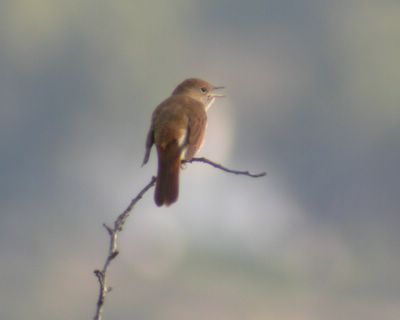
We sit by Roger's deathbed, Alison, Vicki, and I. It is late Sunday afternoon, with the heatwave fading; and Roger lies against a white mountain of pillows. The little window opens on to the mite of grass and the cool moat in whch Roger swam all the year round, writing the preface, as it were, for his strenuous masterpiece Waterlog.
Now he whispers, his familiar voice a kind of human susurration in tune with aspen leaves, and we listen hard to catch his words. He looks, if anything, rather astonished, as do we in our different ways.
When he drove from his ancient farmhouse to mine, he would bring a present: a fine cup, a fine grapefruit sapling he had grown from a pip, and once a wonderful new scythe from Stowmarket. Now and then, we were made to stand side by side at literature festivals and talk about the countryside; and he would laugh, because, he said, I used complete sentences, the kind you read.
And now his light flickers, every now and then flaring into his old self, every now and then on the verge of going out. The rough draft for the jacket of his last book slips on the coverlet. It is called Wildwood: A walk through trees.
I have brought John Clare's poems with me. I read the one that Ted Hughes read in Poets' Corner when we put up a memorial to him. It is called "The Nightingale's Nest", and it describes Clare being torn between his need to come close to the sitting bird and his longing not to scare it. How can he communicate his not being like other men or, rather, boys?
It is a long poem, and Roger's ears, I realise, are not at all dying at this moment. He is listening to Clare as keenly as we listened together to the nightingales at Tiger Hill. Both John Clare and John Keats - they knew of each other and shared the same publisher - believed that the nightingale "lived on song".
Clare was the greater naturalist, and knew all about those physical things that produced the music, the dense coverage below the trees in Royce Wood, the secret nest -
. . . no other bird
Uses such loose materials or
weaves
Their dwellings in such spots
- dead oaken leaves
Are placed without and velvet
moss within,
And little scraps of grass -
and scant and spare
Of what seems scarce
materials, down and hair ...
Walnut Tree Farm, the home that Roger re-created from abandoned materials, has always reminded me of how men, long ago, and maybe even today, had a nest in mind when they looked around for a house. It hides away in foliage that brings secrecy to a vast open common. Going to see him there has often made me think of centuries of spun-out villagers, as anxious to discover what is going on in nests not their own as Clare was when creeping towards his revered nightingale, terrified that she would hear him and her song would be cut short by "choaking fear".
Only a year or two ago, I had heard Roger Deakin recording the creaks and bumps of Walnut Tree Farm on the radio, and the rivery sounds of the Waverney, perfect scraps of nature's conversation. Could we, perhaps, hear John Donne's prayer? The one about the house in which there will be "no noise nor silence, but one equal music . . . no ends nor beginnings, but one equal eternity"? And thus we kiss and leave.
(Church Times - 1st September 2006)




1 comment:
I am so pleased to have found this on your blog site. Although I never met Roger Deakin, his words and broadcasts touched myself and my mother as if we had met him in a whispering lane or some other rural setting as he sorted out his shed rubbish or collected up his organ pipes that were used as steam boxes for bending wood. I had seen the entry by Ronald before, but it was lost as the Church newsletter page was refreshed in November and it was only a strange coincidence that I had scanned the beautiful John Clare blog to find a suitable few lines for my mother's birthday. So once again, the planets align and if there is another place, John Clare was there to have a chat and show Roger around. Thank you so much.
Post a Comment